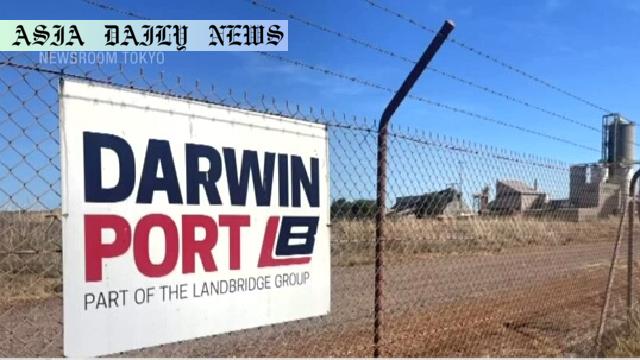Darwin Port: Australia’s government plans to reclaim control of the strategically located port leased to a Chinese firm in 2015.
- Australia plans to reclaim control of Darwin Port leased to a Chinese company.
- The move follows criticism from Beijing and concerns over national security.
- Darwin Port is strategically located near Asia and an Australian naval base used by US forces.
- China insists the lease was secured legally and has benefited the area economically.

Australia’s Decision to Reclaim the Darwin Port
Australia’s government, under Prime Minister Anthony Albanese, has announced bold plans to reclaim control of Darwin Port. This strategic site, located at Australia’s closest point to Asia, was leased to a Chinese company in 2015 for 99 years. Albanese declared during his election campaign that this move is necessary to protect Australia’s national interests and security, especially given the port’s proximity to an Australian naval base used by US forces. This controversial decision has stirred significant debate and highlighted geopolitical tensions in the Indo-Pacific region.
Key Concerns: Strategic Significance and National Security
The Darwin Port is not just a commercial landmark; it holds immense strategic importance due to its location and utility. Its position provides direct access to Asia, making it vital for maritime trade. Additionally, its proximity to a naval base utilized by American forces raises concerns about national security and defense collaboration between the United States and Australia. Many Australian and US officials previously criticized the 2015 lease agreement, citing potential security risks.
China’s Defense of the Lease
China has expressed strong opposition to Australia reclaiming the port. According to Mao Ning, a spokesperson for China’s Foreign Ministry, the lease was obtained lawfully through open market transactions. She stated that the lessee company’s legitimate rights must be honored. Furthermore, China’s Ambassador to Australia, Xiao Qian, emphasized that the Chinese firm played a significant role in improving the port’s operational and financial stability. He criticized Australia’s plan, labeling it ethically questionable since the port has blossomed economically under Chinese management.
International Implications of the Issue
This development has far-reaching implications for Australia’s international relationships, particularly with China and the United States. The move to reclaim Darwin Port signals a shift in Australia’s foreign policy, reflecting a preference for national self-reliance and closer security collaboration with Western allies. On the other hand, Beijing views the potential ousting of the Chinese leaseholder as a political maneuver targeting China’s growing economic influence in the region. The decision also comes at a time of heightened tension in the Indo-Pacific, with regional security becoming a pressing concern for many nations.
Economic vs. Ethical Dilemmas
Australia’s decision to take back control of the port also raises questions about honoring commercial agreements and balancing economic benefits with ethical considerations. While Beijing argues that the port’s operation has been a financial success under the Chinese firm, many Australians worry about over-reliance on foreign entities for critical infrastructure. Critics argue that allowing a foreign nation to manage such a vital port undermines the country’s sovereignty, regardless of the economic benefits derived.
What Lies Ahead?
As Australia moves forward with plans to reclaim Darwin Port, the government must navigate legal and diplomatic challenges carefully. This scenario brings to the forefront key issues such as balancing economic partnership with national security, maintaining regional peace, and ensuring the ethical integrity of foreign investments. It also underscores broader geopolitical dynamics in the Indo-Pacific, where multiple powers vie for influence. Ultimately, the decision regarding Darwin Port may set a significant precedent as economies worldwide grapple with similar concerns about the intersection of commerce and security.



Commentary
Australia’s Strategic Move: A Necessary Step or Risky Gamble?
Australia’s decision to reclaim control of Darwin Port can be viewed as a significant and possibly risky maneuver in its foreign policy. On one hand, it highlights a commitment to prioritizing national security and preserving sovereignty. On the other, it risks further straining relations with China, already a delicate issue given the intertwined economic dependencies between the two nations. The strategic location of the port, near an Australian naval base critical to US-Australian defense cooperation, underscores the decision’s security rationale, making it a contentious yet potentially essential action in today’s geopolitical landscape.
Balancing Economic Growth with Sovereignty
The ethical dimension of this decision cannot be ignored. Australia finds itself in a dilemma—choosing between upholding a long-term lease agreement and safeguarding its critical infrastructure from foreign influence. While China argues that the lessee company has contributed positively to the area’s economy, critics are quick to point out that economic gains should not come at the cost of national security. This raises larger questions about how countries balance economic growth with the safeguarding of sovereignty in an era of globalization.
Regional and Global Implications
The situation also carries potential ripple effects across the Indo-Pacific region. Reclaiming Darwin Port might embolden other nations facing similar concerns over foreign control of key assets. Conversely, it could heighten tensions in an already volatile geopolitical environment, particularly as the US, China, and their allies compete for regional dominance. Australia’s example could influence how smaller countries in the region approach foreign investments and security issues, potentially shaping new norms in international agreements.
Ultimately, the Darwin Port issue serves as a test case for aligning national interests with global cooperation. As Australia and other nations face similar challenges, the lessons learned from this episode will likely influence future policy decisions and international relations dynamics for years to come.